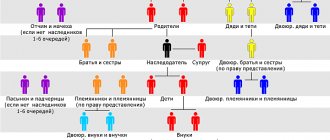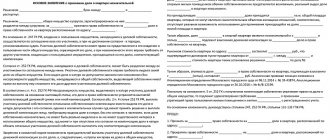Social tenancy agreement Minor child Constantly drinking neighbor Live-in partner
Read on our website about the procedure for eviction from a privatized apartment, in particular for debts, as well as the grounds for eviction from a communal or service apartment.
Can they be evicted from a non-privatized apartment?
Can they be evicted from an apartment if it is not privatized?
The legislation provides for such a possibility . But this requires serious reasons.
There are two options here: voluntary and forced expulsion.
Speaking about voluntary eviction, the main condition must be the consent of the tenant , expressed in the form of a statement sent to the registration authority.
The reasons for such eviction can be different, for example, moving to another country, city, buying a new apartment.
Forced eviction from a municipal apartment can be carried out by court decision and only if the residents do not want to leave the apartment on their own.
Find out everything about the procedures for eviction of registered, unregistered, and illegally residing citizens from our articles.
Grounds for eviction without provision of housing
Although the Russian Constitution guarantees citizens the right to housing, it can be lost by a court decision. For non-privatized apartments, the grounds for eviction to nowhere will be:
- Use of the home for purposes other than its intended purpose. By law, an apartment can only be used for housing. Any other activity (organization of kindergartens, private production, etc.) is prohibited and is fraught with termination of the rental agreement at the request of the owner.
- Violation of neighbors' rights. If you regularly make noise at night, flood the lower floors, or do something similar, prepare for the fact that you may end up on the street.
- Destruction of housing. If you yourself break the walls or communications of the apartment or allow your household to do this, this is also a reason for eviction.
Moreover, in all of the above cases, the owner is obliged to first warn the residents and give them time to stop the violations. And only after such a warning can he go to court with a claim for eviction.
In addition, the court can evict parents who have already been deprived of parental rights from the apartment. This is allowed in cases where their relationship with their children is so bad that they can no longer live together.
Finally, temporary residents may be evicted if their period of residence has expired.
Reasons
Grounds for eviction from an apartment under a social tenancy agreement:
- Constantly causing inconvenience to living neighbors : noisy behavior, drunkenness, drunken fights, etc.
- Using square meters for purposes not intended for this type of housing: creating warehouses , etc.
- Negligent attitude towards the premises, meaning damage to furniture, floors, windows, etc.
- There are no utility bills .
- The apartment is full of insects, there is dirt everywhere, in other words, complete unsanitary conditions.
- Ignoring safety .
- Failure to comply with the conditions specified in the social tenancy agreement.
What documents does the court need?
In addition to the statement itself, the initiator of the process needs to collect evidence of the correctness of his words. Only if there is a properly prepared evidence base will it be possible to expel the defendant from the area he occupies.
You will definitely need:
- an extract from the house register or any other certificate confirming the fact that the evicted citizen resides at a specific address;
- agreement on the provision of an apartment on social rental terms;
- witness's testimonies;
- a receipt for the last payment received for utilities (if there is none, then a certificate is taken from the Housing Office about the debt incurred).
Causes
- Unfulfilled debt obligations (regular non-payment of utilities).
- Use of square meters for other purposes.
- Violation of the rules of residence, infringement of the rights of neighbors.
- End of temporary registration.
- Sale of an apartment.
- Long absence from living space, for example a long business trip.
- Divorce proceedings.
Methods
In the case of non-privatized apartments, other housing is not provided. But they always look at the situation and make exceptions. For example, if the evicted person has nowhere to go, the judge may grant a delay to resolve the problem.
But it is you who decide it, and not the state. Based on your capabilities, you can rent an apartment or a room in a dorm.
In addition, if the deportation occurs through no fault of yours , namely:
- demolition of a residential building;
- eviction from emergency housing under a social rental agreement;
- transfer of communal apartments to non-residential stock.
In this case, you will not be in danger of staying on the street; in return, you will be provided with other housing.
Can a citizen now be evicted from non-privatized housing?
The procedure for eviction of people from municipal apartments is given in the Housing Code (specifically in articles 83, 90 and 91). Moreover, in the fourth part of Art. 69 it is reported that after the loss of family ties, Russians do not lose the right to use common premises occupied on the basis of a social tenancy agreement.
It will be possible to remove the person registered there from a municipal apartment after filing a divorce if he:
- in fact lives in another place;
- doesn't pay bills.
All this becomes grounds for eviction from non-privatized apartments, but action will have to be taken through the courts.
Who cannot be deprived of housing?
Which persons are not subject to eviction from a residential premises under a social tenancy agreement? from non-privatized housing :
- disabled people of groups 1 and 2;
- old age pensioners;
- minors, including children without parental care;
- family members of the deceased (deceased) employer, including law enforcement officers;
- a person refusing privatization in his own favor, granting this right to another member of the family.
Eviction procedure
- The required package of papers is collected and an application is submitted to a court of general jurisdiction.
- State duty is paid . It is 300 rubles for individuals and 6 thousand rubles for legal entities.
- Within two months, the case is considered and a decision is made.
- Both parties have 10 days to file an appeal.
- The decision comes into force and its execution is transferred to the bailiffs.
When can registration be refused?
- Incomplete package of documents.
- Failure to pay state duty.
- Incorrectly completed application.
- Lack of evidence of violations.
There is a workaround other than litigation. It is very simple - it is selling an apartment . Then you “shift” your problems onto the shoulders of the new owner; he will deal with unwanted tenants.
Eviction upon change of ownership is carried out at the will of the current owner. Very often, old owners do not want to just leave their home, in which case this issue is resolved through legal proceedings.
Article 292 states that after the apartment is transferred to the new owner, the old residents have no rights to it. This means that they cannot live in it or dispose of it without the permission of the new owners.
And even selling is not the only way out. Many people do not want to part with their apartment or get involved with strangers. This is where donating an apartment comes to the rescue . That is, you give an apartment to someone you trust, and he, with the rights of an owner under Article 292, evicts all unwanted tenants.
Such a deal must be concluded exclusively with trusted people, otherwise you can easily be scammed, and you will never be able to return the apartment.
Features and nuances
Social tenancy agreement
Eviction from such an apartment is carried out only by the owner in court and on the grounds available for this. In this case, they very often provide a “roof over their head ,” for example, a room in a dorm, but this is not always something to hope for.
If the basis for the eviction procedure is non-payment of housing and communal services, then you can fully count on the provision of square meters for subsistence. Not all tenants are always evicted. Sometimes this may affect a specific offender.
Minor child
A child who has not reached the age of majority can alleviate the situation.
Eviction is possible only in certain cases:
- parents, in addition to the non-privatized apartment, have other living space;
- The new place of residence is not inferior in size to the old one.
it is impossible to evict the child, and with him the parents .
Constantly drinking neighbor
A common problem in a residential building is a neighbor who is always tipsy and causes serious discomfort. To evict a tenant, you need an impressive evidence base.
It’s one thing to see the violations yourself, and another to have a document from one of the relevant organizations (for example, from the sanitary and epidemiological station).
It is necessary to prove that the citizen’s continued stay in the apartment will lead to inevitable consequences.
Roommate
Everything here is as simple as shelling pears: collect complaints from neighbors and submit them to the district police officer . After this, a warning will be sent to the violator, if ignored, the case will be considered in court and most likely the result for him will be disappointing - eviction.
To prevent unnecessary problems from arising, each issue must be thoroughly studied. The topic of eviction from a non-privatized apartment was no exception.
Armed with this information, you can be sure that no unpleasant situations will arise during the process and carrying out the eviction procedure will be an easy task.
If the apartment is not privatized, can they be evicted from it? Find out about it in the video:
Eviction from the apartment
When living in a non-privatized apartment, you should understand that housing legislation applies to everyone and must be strictly followed in order to avoid trouble with the law. Housing legislation in the Russian Federation has a set of established rules, in case of violation of which residents living in non-privatized apartments may be subject to the most extreme form of punishment - eviction.
Having registration in a non-privatized apartment gives the tenant the right to:
- Accommodation in the specified territory.
- Use of property.
He is assigned responsibilities for:
- Keep it clean and tidy.
- Maintain acceptable living conditions in the premises, carry out maintenance repairs and improvement of housing.
- Pay for housing and communal services.
While living in such a residential area, you can register your family members for this territory, but you cannot dispose of real estate, namely:
- Sell.
- Give.
- Bequeath.
Eviction from a non-privatized apartment is possible for violations of housing legislation.






